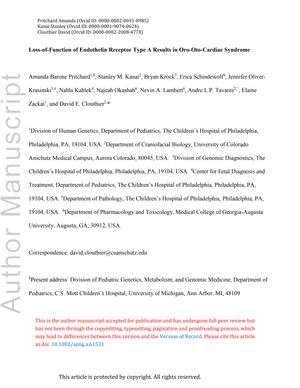Loss-Of-Function of Endothelin Receptor Type A Results in Oro-Oto-Cardiac Syndrome
March 2020
in “
American Journal of Medical Genetics Part A
”

TLDR A mutation in the EDNRA gene causes Oro-Oto-Cardiac syndrome, affecting face and heart development.
The study identified a novel homozygous missense variant in the Endothelin receptor type A (EDNRA) gene, specifically the p.Q381P mutation, which resulted in a loss-of-function allele causing Oro-Oto-Cardiac syndrome. This condition was characterized by craniofacial and cardiovascular malformations, similar to those in Ednra knockout mice. The variant disrupted G protein recruitment to the receptor, preventing activation by Endothelin-1, and impaired the induction of Dlx5 and repression of Dlx2, essential for craniofacial development. The study emphasized the importance of EDNRA signaling in craniofacial and cardiovascular development and demonstrated the utility of combining genetic sequencing with functional analysis to identify genetic conditions. The family involved used pre-implantation genetic diagnosis to avoid passing the variant to future children.